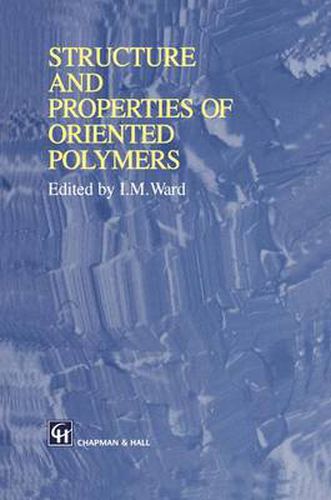Readings Newsletter
Become a Readings Member to make your shopping experience even easier.
Sign in or sign up for free!
You’re not far away from qualifying for FREE standard shipping within Australia
You’ve qualified for FREE standard shipping within Australia
The cart is loading…






This title is printed to order. This book may have been self-published. If so, we cannot guarantee the quality of the content. In the main most books will have gone through the editing process however some may not. We therefore suggest that you be aware of this before ordering this book. If in doubt check either the author or publisher’s details as we are unable to accept any returns unless they are faulty. Please contact us if you have any questions.
The first edition was produced at a time when the advantages of studying oriented polymers were just becoming apparent. From a sci entific stand point it had been demonstrated that greater insight into both structure and properties could be obtained if an oriented polymer was prepared. From a technological viewpoint, major advances were under way, especially in high modulus and high strength fibres. Twenty years later, it is possible to review the scientific advances which have been made in this area and to provide much wider perspectives for the technology. As in the case of the first edition, the emphasis is on the methodologies available for characterizing oriented polymers and their mechanical behaviour. It is a particular pleasure to thank the contributing authors for their cooperation and Dr Philip Hastings of Chapman & Hall for his support and encouragement. I am also indebted to Professors A. H. Windle and D. C. Bassett for their respective contributions to sections 1. 3. 1 and 1. 3. 4. Although this chapter has been extensively revised, the contribution of the late Leslie Holliday to the first edition of this book is also acknowledged. Introduction 1 I. M. Ward 1. 1 THE PHENOMENON OF ORIENTATION Orientation in polymers is a phenomenon of great technical and theo retical importance. The word orientation itself conveys a number of ideas.
$9.00 standard shipping within Australia
FREE standard shipping within Australia for orders over $100.00
Express & International shipping calculated at checkout
This title is printed to order. This book may have been self-published. If so, we cannot guarantee the quality of the content. In the main most books will have gone through the editing process however some may not. We therefore suggest that you be aware of this before ordering this book. If in doubt check either the author or publisher’s details as we are unable to accept any returns unless they are faulty. Please contact us if you have any questions.
The first edition was produced at a time when the advantages of studying oriented polymers were just becoming apparent. From a sci entific stand point it had been demonstrated that greater insight into both structure and properties could be obtained if an oriented polymer was prepared. From a technological viewpoint, major advances were under way, especially in high modulus and high strength fibres. Twenty years later, it is possible to review the scientific advances which have been made in this area and to provide much wider perspectives for the technology. As in the case of the first edition, the emphasis is on the methodologies available for characterizing oriented polymers and their mechanical behaviour. It is a particular pleasure to thank the contributing authors for their cooperation and Dr Philip Hastings of Chapman & Hall for his support and encouragement. I am also indebted to Professors A. H. Windle and D. C. Bassett for their respective contributions to sections 1. 3. 1 and 1. 3. 4. Although this chapter has been extensively revised, the contribution of the late Leslie Holliday to the first edition of this book is also acknowledged. Introduction 1 I. M. Ward 1. 1 THE PHENOMENON OF ORIENTATION Orientation in polymers is a phenomenon of great technical and theo retical importance. The word orientation itself conveys a number of ideas.